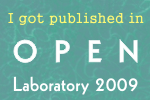As everyone knows by now, PloS-1 published what seemed to be a creationist paper. While references to the ‘Creator’ were few, the wording of the paper strongly supported intelligent design in human hand development. A later statement from the first author seemed to eschew actual creationism, but maintained teleological (if not theological) view of evolution, […]
Four years ago I wrote about how Open Access would be adopted if it were convenient. Polls at the time showed that few scientists actively seek to publish OA, even though many support it. Reasons given, in no particular order: aiming for journals that were not OA and high publication fees. My conclusion was that researchers […]
(With apologies to the memory of Elizabeth Barrett Browning) How shall I license thee? Let me count the ways I license thee to be free to distribute and embed My code can be buggy, when I wrote it late last night “While” loops have been made without a stated end I license thee to change […]
I recently received an email from PLoS-ONE summarizing my editorial activity for the first half of 2014. That’s a good thing: for one, I’m terrible at keeping track of all my service activities, and this helps in keeping them straight for my own annual activities report for my university. Second, I can see how I […]
(From Peter Cock, via the OBF News Blog) We’re pleased to officially confirm that one of the two keynote speakers for the 15th annual Bioinformatics Open Source Conference (BOSC 2014) will be C. Titus Brown, as he announced on Twitter recently: Titus Brown (@ctitusbrown): Excited to be a keynote speaker at BOSC 2014! My […]
We have Palaeolithic emotions, medieval institutions and God-like technologies. E.O. Wilson Whole genome sequencing will soon be cheap enough to be widely affordable. We are nearing the time when omics data may be retained for patients on a wide basis. These may include full exome, haplotype, full genome sequencing, tissue level transcriptomic data, microbiome […]
Since this is Open Access Week, I thought I’d do the Open-Access / CC thing and share someone else’s work. In this case, a highly topical short story written by Richard Stallman. The author also has a constantly updated page with comments on the restrictions placed today on sharing reading materials. As you will see, […]
Yesterday I received an email from Kristjan Liiva, a student at RWTH Aachen University Germany. Kristjan has developed a really cool dashboard to analyze and visualize the development of collaborative OSS projects by mining their mailing lists and software repositories. (If the link doesn’t work, try again later; the project is heavily under development). The […]
Should DNA be subject to copyright law, rather than patent law? Section 101 of Title 35 U.S.C. sets out the subject matter that can be patented: Whoever invents or discovers any new and useful process, machine, manufacture, or composition of matter, or any new and useful improvement thereof, may obtain a patent therefor, subject to the […]
I love it when other people use my ideas, especially before I think them up. After my previous post advocating group review of scientific articles, it was pointed out to me that two journals are already using group reviews to referee their papers. One is Frontiers (which is a collection of journals, rather than a […]
I didn’t have a clever title. “PeerJ: a new kid on the block” was already taken by Bora Zivkovic. “PeerJ: Publish there or suffer” is aggressively counterproductive. “PeerJ is awesome”. Meh. So: PeerJ. A new open access scientific journal. PeerJ is the brainchild of Peter Binfield who was the managing editor of PLoS-one, and Jason Hoyt who […]
Today is the last day of Open Access Week, where all things Open Access are heralded. William Gunn gave a great talk here at MU on how open access is changing scholarship. (And a big thank you to our librarians Jen Waller & Kevin Messner for hosting William!) I have posted about Open Access before, […]
So there have been a few reactions to my latest post on accountable research software, including a Tweeter kerfuffle (again). Ever notice how people come out really aggressive on Twitter? Must the the necessity to compress ideas into 140chars. You can’t just write “Interesting point you make there, sir. Don’t you think that your laudable goal would […]
Preamble: this post is inspired by a series of tweets that took place over the past couple of days. I am indebted to Luis Pedro Coelho (@LuisPedroCoelho) and to Robert Buels (@rbuels) for a stimulating, 140-char-at-a-time discussion. Finally, my thanks (and yours, hopefully) to Ben Temperton for initiating the Bioinformatics Testing Consortium. Science is messing around with […]
There has been quite a lot of chatter recently about different scientific publishing models. Prompted by Elsevier’s support for the Research Works Act, and the resulting proposed academic boycott. Let there be no mistake: I value the Open Access (OA )model of publication, for both moral and practical reasons that have been elaborated upon in […]





